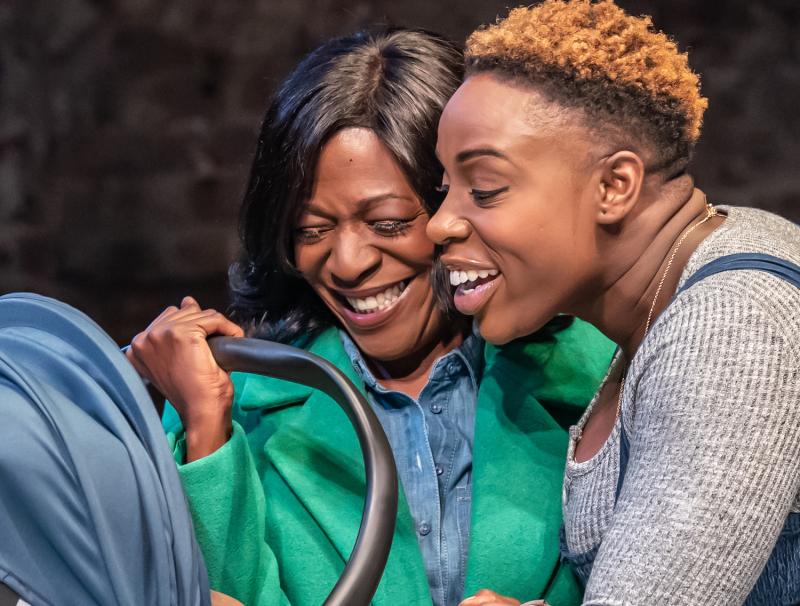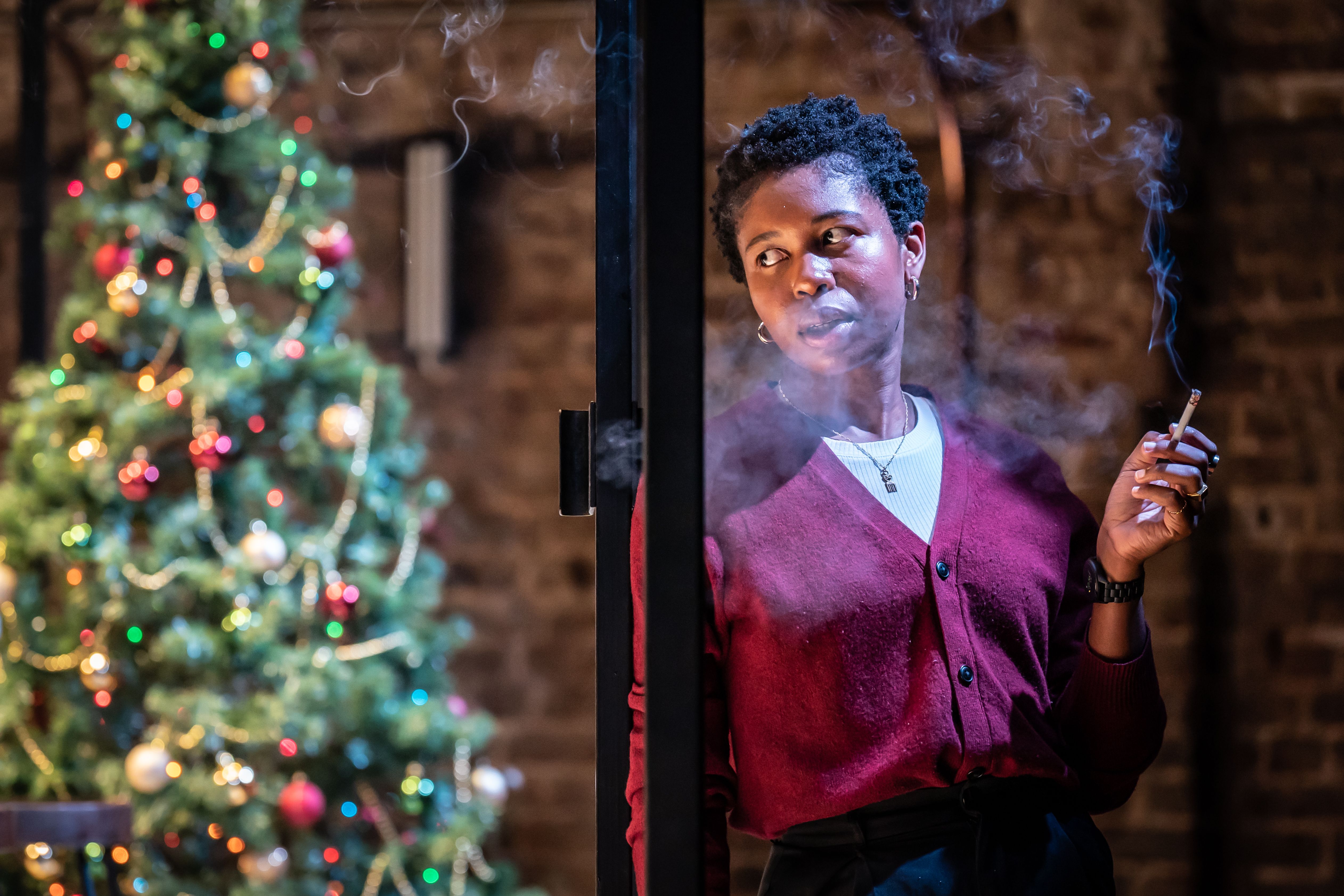The Clinic, Almeida Theatre review - race and the status quo | reviews, news & interviews
The Clinic, Almeida Theatre review - race and the status quo
The Clinic, Almeida Theatre review - race and the status quo
Dipo Baruwa-Etti pits a fiery outsider activist against the British-Nigerian middle-class

As Dipa Baruwa-Etti’s latest play, The Clinic, reminds us, the Tory party has a strong showing of Black MPs – Badenoch, Cleverly, Kwarteng. It was finished long before the latest Cabinet appointments, but presciently picked those three names, all now with key ministerial roles.
But the title isn’t strictly a reference to the regular meeting MPs hold with the public, even though one of the characters, Amina (Mercy Ojelade), is a struggling Labour MP. The term is what one upwardly mobile Nigerian family believe they can offer less fortunate Black people – and, in particular, Wunmi (Toyin Ayedun-Alase), whose husband has just died and who is contemplating suicide after securing a safe home for her baby son.  Assisting her is Ore (Gloria Obianyo), a disillusioned trainee doctor who tried to save Wunmi’s husband and ascribes his death to her institutionally racist hospital, which she believes sent him home too soon. When Ore describes Wunmi’s plight to her mother Tiwa (Donna Berlin), a psychology graduate who volunteers at a women’s centre, Tiwa immediately takes over and insists Wunmi and her son move into the family home for a week. “We’ve got power,” she claims, “Between us, we’re like a clinic.”
Assisting her is Ore (Gloria Obianyo), a disillusioned trainee doctor who tried to save Wunmi’s husband and ascribes his death to her institutionally racist hospital, which she believes sent him home too soon. When Ore describes Wunmi’s plight to her mother Tiwa (Donna Berlin), a psychology graduate who volunteers at a women’s centre, Tiwa immediately takes over and insists Wunmi and her son move into the family home for a week. “We’ve got power,” she claims, “Between us, we’re like a clinic.”
Wunmi’s arrival will force this privileged family – whose ranks include a psychotherapist and a police detective – to confront their own Blackness, what it means to them and what they are prepared to do to help their community. Their beliefs start to wobble in the face of her fiery activism. Do you change things from within the system or outside it? How much of her fire will they allow into their lives? And will she risk compromising it by allowing them to help her?
To underline the fire image, the text throws in many an example of flames and ashes. Almost too many, in fact, as if Baruwa-Etti is afraid we won’t get the point. Monique Touko’s staging also puts the image centre-stage. Smoke rises in the very first scene, as we see Wunmi creating her protest placards and peering down into a smoky void; it seeps, too, into the family’s elegant kitchen, initially from burnt cakes, candles and cigarettes. Ominously, the lights flicker at certain points, as characters start edging towards unspoken truths.
It’s a sign of the distance Tiwa’s psychotherapist husband Segun (Maynard Eziashi) has travelled from his community that he’s written a potentially profitable self-help book about it, The Fire Inside. Segun’s fire isn’t the political kind, as Wunmi discovers when he offers to write about her life. She too has to re-evaluate what she believes, after finding she has let herself be taken in by – gasp – Tories, the party whose policies, she cries, have kept her downtrodden. Worse, Tiwa and Segun’s son Bayo (Simon Manyonda), married to Amina, is a newly promoted detective. He’s “a pig” to Wunmi, the other source of so much of her community’s grief, whereas Bayo see himself as somebody seeking “peace” for them.
This fractious group talk over each other for a little too much of the time. It’s what the playwright intended and makes the point that they have stopped listening to each other properly, but it also means that the dialogue doesn’t always come through clearly enough. This is a shame as Baruwa-Etti is tackling a big and complex subject, a kaleidoscopic look at what it means to be a Black person who wants to change the status quo. But the chunks of text with a strong message – about the inequity of Black experience of policing and the NHS, in particular – stand proud, with a lyrical, rhyming-couplet lilt to them.
This is overall a fine staging in Paul Wills's beautifully designed set – a lavish modern kitchen with obligatory Quooker tap and modish furniture that covers a trapdoor to Wunmi’s personal hell. Over it all hangs a tribal mask, whose eyes gleam in the darkness.
The cast are superb, especially Obianyo's Ore with her pinsharp comic timing and acrid humour, delivering the often trenchant and punchily funny dialogue with panache, and breaking into bouts of infectious dancing and singing. It's an enjoyable mix, even though it's a complicated piece that needs a lot of digesting. The play's aftertaste is sour, though: the realities of Black British life for most of the community are not fixable with some of Tiwa’s special tea.
rating
Share this article
The future of Arts Journalism
You can stop theartsdesk.com closing!
We urgently need financing to survive. Our fundraising drive has thus far raised £49,000 but we need to reach £100,000 or we will be forced to close. Please contribute here: https://gofund.me/c3f6033d
And if you can forward this information to anyone who might assist, we’d be grateful.

Subscribe to theartsdesk.com
Thank you for continuing to read our work on theartsdesk.com. For unlimited access to every article in its entirety, including our archive of more than 15,000 pieces, we're asking for £5 per month or £40 per year. We feel it's a very good deal, and hope you do too.
To take a subscription now simply click here.
And if you're looking for that extra gift for a friend or family member, why not treat them to a theartsdesk.com gift subscription?
more Theatre
 Bacchae, National Theatre review - cheeky, uneven version of Euripides' tragedy
Indhu Rubasingham's tenure gets off to a bold, comic start
Bacchae, National Theatre review - cheeky, uneven version of Euripides' tragedy
Indhu Rubasingham's tenure gets off to a bold, comic start
 The Harder They Come, Stratford East review - still packs a punch, half a century on
Natey Jones and Madeline Charlemagne lead a perfectly realised adaptation of the seminal movie
The Harder They Come, Stratford East review - still packs a punch, half a century on
Natey Jones and Madeline Charlemagne lead a perfectly realised adaptation of the seminal movie
 The Weir, Harold Pinter Theatre review - evasive fantasy, bleak truth and possible community
Three outstanding performances in Conor McPherson’s atmospheric five-hander
The Weir, Harold Pinter Theatre review - evasive fantasy, bleak truth and possible community
Three outstanding performances in Conor McPherson’s atmospheric five-hander
 Dracula, Lyric Hammersmith review - hit-and-miss recasting of the familiar story as feminist diatribe
Morgan Lloyd Malcolm's version puts Mina Harkness centre-stage
Dracula, Lyric Hammersmith review - hit-and-miss recasting of the familiar story as feminist diatribe
Morgan Lloyd Malcolm's version puts Mina Harkness centre-stage
 Reunion, Kiln Theatre review - a stormy night in every sense
Beautifully acted, but desperately grim drama
Reunion, Kiln Theatre review - a stormy night in every sense
Beautifully acted, but desperately grim drama
 The Code, Southwark Playhouse Elephant review - superbly cast, resonant play about the price of fame in Hollywood
Tracie Bennett is outstanding as a ribald, riotous Tallulah Bankhead
The Code, Southwark Playhouse Elephant review - superbly cast, resonant play about the price of fame in Hollywood
Tracie Bennett is outstanding as a ribald, riotous Tallulah Bankhead
 The Lady from the Sea, Bridge Theatre review - flashes of brilliance
Simon Stone refashions Ibsen in his own high-octane image
The Lady from the Sea, Bridge Theatre review - flashes of brilliance
Simon Stone refashions Ibsen in his own high-octane image
 Romans: A Novel, Almeida Theatre review - a uniquely extraordinary work
Alice Birch’s wildly epic family drama is both mind-blowing and exasperating
Romans: A Novel, Almeida Theatre review - a uniquely extraordinary work
Alice Birch’s wildly epic family drama is both mind-blowing and exasperating
 The Producers, Garrick Theatre review - Ve haf vays of making you laugh
You probably know what's coming, but it's such great fun!
The Producers, Garrick Theatre review - Ve haf vays of making you laugh
You probably know what's coming, but it's such great fun!
 Not Your Superwoman, Bush Theatre review - powerful tribute to the plight and perseverance of Black women
Golda Rosheuvel and Letitia Wright excel in a super new play
Not Your Superwoman, Bush Theatre review - powerful tribute to the plight and perseverance of Black women
Golda Rosheuvel and Letitia Wright excel in a super new play
 Cow | Deer, Royal Court review - paradox-rich account of non-human life
Experimental work about nature led by Katie Mitchell is both extraordinary and banal
Cow | Deer, Royal Court review - paradox-rich account of non-human life
Experimental work about nature led by Katie Mitchell is both extraordinary and banal

Add comment